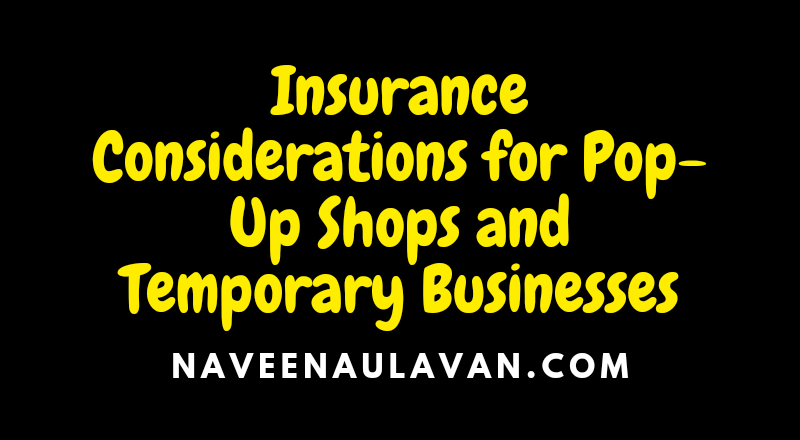The concept of pop-up shops and temporary businesses has gained popularity in recent years. These short-term retail establishments provide an opportunity for entrepreneurs artists and small business owners to test the market generate buzz and increase sales. However like any business venture pop-up shops and temporary businesses face risks that can be mitigated through proper insurance coverage. In this article we will explore the insurance considerations that are important for pop-up shops and temporary businesses.
Risk Factors Associated with Pop-Up Shops and Temporary Businesses
Before delving into insurance considerations let’s first understand the risks that pop-up shops and temporary businesses are exposed to. Some of the common risk factors associated with these types of businesses include:
1. Property Damage and Theft: Pop-up shops and temporary businesses often operate in rented spaces which makes them vulnerable to property damage and theft. This can include damage to merchandise fixtures furniture or any other property associated with the business.
2. Liability Claims: Whether it’s slip and fall accidents or product-related injuries pop-up shops and temporary businesses can face liability claims from individuals who suffer harm while on the premises or using the products or services provided.
3. Business Interruption: Any unexpected event such as a fire or natural disaster can lead to business interruption resulting in lost revenue and additional expenses. Since pop-up shops and temporary businesses are often time-sensitive ventures any disruption can significantly impact the overall success of the operation.
4. Staff and Volunteer Considerations: Depending on the nature of the pop-up shop or temporary business hiring temporary staff or working with volunteers may be necessary. This brings up additional concerns related to employee injuries employment practices liability and adequate training.
5. Cybersecurity Risks: As with any business operating in the digital age pop-up shops and temporary businesses may handle customer data and process transactions electronically. This exposes them to cybersecurity risks such as data breaches phishing attacks or other forms of cybercrime.
Insurance Coverage to Consider
To protect against potential risks and liabilities pop-up shops and temporary businesses should consider obtaining the following insurance coverage:
1. General Liability Insurance: General liability insurance provides coverage for third-party bodily injury property damage and associated legal expenses. It protects against claims arising from slip and fall accidents product liability and other unforeseen incidents. This coverage is essential for any business including pop-up shops and temporary businesses.
2. Property Insurance: Property insurance provides coverage for physical assets such as merchandise inventory equipment and furniture. Since pop-up shops and temporary businesses operate in rented spaces it is important to ensure that both owned and rented property are adequately covered.
3. Business Interruption Insurance: Business interruption insurance provides coverage for lost income and extra expenses incurred due to a covered peril. This coverage can help mitigate the financial impact of unforeseen events that lead to temporary closure or disruption of the business.
4. Workers’ Compensation Insurance: If you have temporary employees or volunteers workers’ compensation insurance is crucial. It provides coverage for medical expenses lost wages and legal fees if an employee or volunteer is injured on the job.
5. Cyber Liability Insurance: With the increasing reliance on digital operations pop-up shops and temporary businesses are vulnerable to cyber risks. Cyber liability insurance helps cover the costs associated with data breaches cyber-attacks and related liabilities. It can provide coverage for expenses such as data breach notification credit monitoring and legal defense.
6. Event Insurance: If your pop-up shop or temporary business is associated with specific events or exhibitions event insurance can provide coverage for liabilities arising from the event as well as protection for property and equipment brought to the event.
7. Product Liability Insurance: If your pop-up shop or temporary business involves the sale of products product liability insurance is vital. It protects against claims arising from injuries or damages caused by products sold or distributed by your business.
Additional Considerations
In addition to obtaining the necessary insurance coverage pop-up shops and temporary businesses should consider taking the following steps to further protect their operations:
1. Risk Assessment: Conduct a thorough risk assessment to identify potential hazards and vulnerabilities specific to your business. This can help determine the appropriate coverage limits and policy endorsements required.
2. Contractual Obligations: Review any lease agreements or contracts with event organizers to understand the insurance requirements and endorsements needed for compliance.
3. Documentation: Maintain accurate records of inventory equipment and other valuable assets. This documentation can be crucial for claiming insurance coverage in case of loss or damage.
4. Safety Measures: Implement proper safety protocols such as regular equipment maintenance fire prevention and training programs for employees and volunteers. This can help mitigate the risk of accidents and injuries.
5. Insurance Review: Regularly review your insurance policies to ensure they align with the specific needs of your pop-up shop or temporary business. As your business evolves insurance coverage should be updated accordingly.
Conclusion
While pop-up shops and temporary businesses offer unique opportunities for entrepreneurs it’s essential to consider the insurance considerations to protect against potential risks and liabilities. By obtaining the appropriate insurance coverage and implementing risk management strategies pop-up shops and temporary businesses can minimize their exposure to financial losses and focus on the success of their operations.
